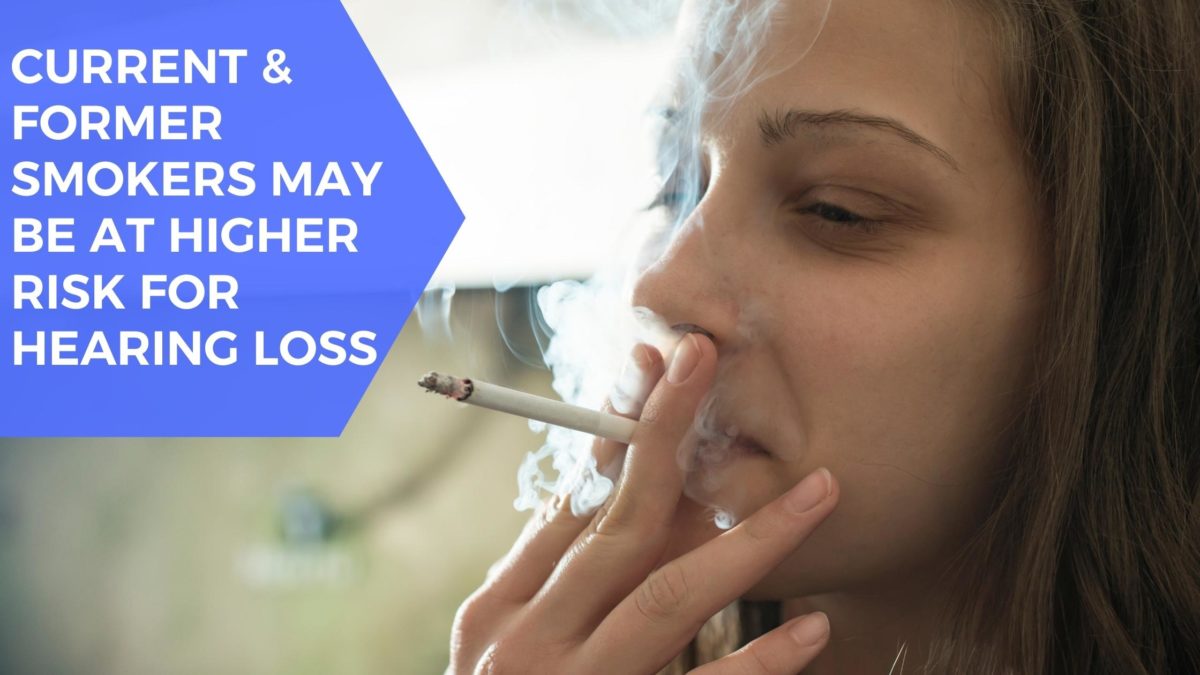Common health risks associated with smoking include cancer, heart disease, and high blood pressure. Recent research shows that there is a link between smoking and hearing loss, adding to the various negative health outcomes that smoking contributes to. Studies show that current and former smokers may experience a higher risk for developing hearing loss. Additionally, the more you smoke, the higher the risk is.
Link Between Smoking & Hearing Loss
Emerging research shows that smoking and hearing loss can be related conditions. This correlation is explored in two recent studies:
- 2018 Study Published in the Nicotine & Tobacco Research Journal: conducted in Japan, researchers analyzed data collected for 8 years on nearly 50,000 people, ages 20-64. At the beginning of the study, participants did not have hearing loss. The study involved measuring hearing capacity as well as assessing smoking habits. During the 8-year study, 5,100 people developed hearing loss. Key findings include that compared to nonsmokers, people who currently smoked were:
- 60% more likely to develop high frequency hearing loss
- 20% more likely to develop low frequency hearing loss
Additionally, researchers found that the more one smoked, the higher the risk was of developing hearing loss. People who smoked:
- Up to 10 cigarettes per day were 40% more likely to develop high frequency hearing loss and 10% more likely to develop low frequency hearing loss.
- 11-20 cigarettes per day were 60% more likely to develop high frequency hearing loss and 20% more likely to develop low frequency hearing loss.
- 20+ cigarettes per day were 70% more likely to develop high frequency hearing loss and 40% more likely to develop low frequency hearing loss.
- 2020 Study published in the American Journal of Medicine: this study involved 81,505 participants and was conducted over a 22 year period. During the study, 2,760 people developed hearing loss. After analyzing data on hearing loss and smoking habits, researchers found that:
- Smokers were 60% more likely to develop high frequency hearing loss compared to nonsmokers
In addition to the correlation between smoking and increased risk of hearing loss, these studies also highlighted that people who quit smoking (even 10 years prior) still experience a higher risk of developing hearing loss compared to non-smokers.
Impact of Smoking on Hearing Health
How exactly does smoking impact hearing health? Researchers suggest that there are a few ways that smoking impacts health and increases the risk of developing hearing loss. This includes:
- Decreases blood circulation: nicotine causes the blood vessels to constrict, limiting healthy blood flow throughout the body. This includes the ears which then affects the capacity to absorb and process sound. Then the inner ear does not receive enough oxygen, the hair cells can be damaged. These hair cells help translate incoming sound waves into electrical signals and send them to the brain to be processed. When damaged, their function is reduced, leading to hearing loss.
- Increases blood pressure: smoking also increases blood pressure and heart rate. This can constrict or block arteries, increasing the risk of heart attacks, blood clots, and strokes. Impacting the blood vessels, including in the inner ear, can lead to permanent damage like hearing loss.
- Impacts nerves: in addition to the narrowing of blood vessels, nicotine can impact the nerves and neural pathways. It can disrupt neurotransmitters from sending auditory information between the ears and brain. This can lead to difficulty hearing as sounds are muffled.
Prevention & Treatment
If you are a smoker, reducing or eliminating this habit can drastically protect your hearing health (as well as overall health). Additionally, you should have your hearing assessed regularly. You can do this by scheduling an appointment with us for a hearing test. This process is painless and relatively quick! It involves measuring hearing capacity in both ears which identifies any impairment and the degree of hearing loss you could be experiencing. Fortunately, there are useful ways that hearing loss is treated. The most common treatment is hearing aids which are designed to detect and process sound. This transforms hearing as well as offers life-changing benefits: strengthens communication, enhances social life, and improves relationships. Prioritize your hearing health today and schedule an appointment.

